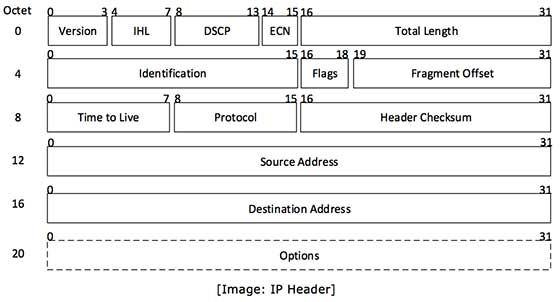Data packet: Difference between revisions
Mr. MacKenty (talk | contribs) (→Skills) |
|||
| (8 intermediate revisions by one other user not shown) | |||
| Line 2: | Line 2: | ||
[[file:network.png|right|frame|Networks<ref>http://www.flaticon.com/</ref>]] | [[file:network.png|right|frame|Networks<ref>http://www.flaticon.com/</ref>]] | ||
A packet is a basic unit of communication over a digital network. A packet is also called a datagram, a segment, a block, a cell or a frame, depending on the protocol used for the transmission of data. When data has to be transmitted, it is broken down into similar structures of data before transmission, called packets, which are reassembled to the original data chunk once they reach their destination. | A packet is a basic unit of communication over a digital network. | ||
A packet is also called a datagram, a segment, a block, a cell or a frame, depending on the protocol used for the transmission of data. When data has to be transmitted, it is broken down into similar structures of data before transmission, called packets, which are reassembled to the original data chunk once they reach their destination. | |||
The structure of a packet depends on the type of packet it is and on the protocol. Normally, a packet has a header and a payload. | The structure of a packet depends on the type of packet it is and on the protocol. Normally, a packet has a header and a payload. | ||
| Line 16: | Line 18: | ||
* The payload, which represents the bulk of the packet (all the above is considered as overhead), and is actually the data being carried. | * The payload, which represents the bulk of the packet (all the above is considered as overhead), and is actually the data being carried. | ||
(Above used with gratitude from: https://www.lifewire.com/what-is-a-data-packet-3426310<ref>https://www.lifewire.com/what-is-a-data-packet-3426310</ref>) | (Above used with gratitude from: https://www.lifewire.com/what-is-a-data-packet-3426310<ref>https://www.lifewire.com/what-is-a-data-packet-3426310</ref>) [[File:DataPacket short.ogg]] | ||
== A diagram of a packet == | == A diagram of a packet == | ||
| Line 43: | Line 45: | ||
OS X / Linux : <syntaxhighlight inline lang="bash">sudo tcpdump -nnSX port 443</syntaxhighlight> | OS X / Linux : <syntaxhighlight inline lang="bash">sudo tcpdump -nnSX port 443</syntaxhighlight> | ||
OS X / Linux: <syntaxhighlight inline lang="bash">sudo tcpdump -nnSX port 80</syntaxhighlight> (visit example.com after running this command). | |||
tcpdump is a complex and powerful tool to view packets. There is a superb website to learn more about this, [https://danielmiessler.com/study/tcpdump/ you can request by clicking this link] | tcpdump is a complex and powerful tool to view packets. There is a superb website to learn more about this, [https://danielmiessler.com/study/tcpdump/ you can request by clicking this link] | ||
== | == Standards == | ||
These standards are used from the IB Computer Science Subject Guide<ref>IB Diploma Programme Computer science guide (first examinations 2014). Cardiff, Wales, United Kingdom: International Baccalaureate Organization. January 2012.</ref> | |||
* Define the terms: protocol, data packet | * Define the terms: protocol, data packet | ||
== References == | == References == | ||
<references /> | <references /> | ||
[[Category: | [[Category:networks]] | ||
[[Category: | [[Category:formative assessment]] | ||
Latest revision as of 06:22, 8 January 2023

A packet is a basic unit of communication over a digital network.
A packet is also called a datagram, a segment, a block, a cell or a frame, depending on the protocol used for the transmission of data. When data has to be transmitted, it is broken down into similar structures of data before transmission, called packets, which are reassembled to the original data chunk once they reach their destination.
The structure of a packet depends on the type of packet it is and on the protocol. Normally, a packet has a header and a payload.
The header keeps overhead information about the packet, the service, and other transmission-related data. For example, data transfer over the Internet requires breaking down the data into IP packets, which is defined in IP (Internet Protocol), and an IP packet includes:
- The source IP address, which is the IP address of the machine sending the data.
- The destination IP address, which is the machine or device to which the data is sent.
- The sequence number of the packets, a number that puts the packets in order such that they are reassembled in a way to get the original data back exactly as it was prior to transmission.
- The type of service
- Flags
- And some other technical data
- The payload, which represents the bulk of the packet (all the above is considered as overhead), and is actually the data being carried.
(Above used with gratitude from: https://www.lifewire.com/what-is-a-data-packet-3426310[2])
A diagram of a packet[edit]
Looking for a basic introduction to packets ?[edit]
Skills[edit]
You should be aware how to capture and view packets. Diagnosing network problems via packet analysis is not within the scope of IB Computer Science, but you should be able to view a network packet. The de-facto tool for this stuff is wireshark. It will take you many hours to learn how to use wireshark.
OS X : nettop -m tcp
OS X / Linux : sudo tcpdump -nnSX port 443
OS X / Linux: sudo tcpdump -nnSX port 80 (visit example.com after running this command).
tcpdump is a complex and powerful tool to view packets. There is a superb website to learn more about this, you can request by clicking this link
Standards[edit]
These standards are used from the IB Computer Science Subject Guide[3]
- Define the terms: protocol, data packet
References[edit]
- ↑ http://www.flaticon.com/
- ↑ https://www.lifewire.com/what-is-a-data-packet-3426310
- ↑ IB Diploma Programme Computer science guide (first examinations 2014). Cardiff, Wales, United Kingdom: International Baccalaureate Organization. January 2012.
